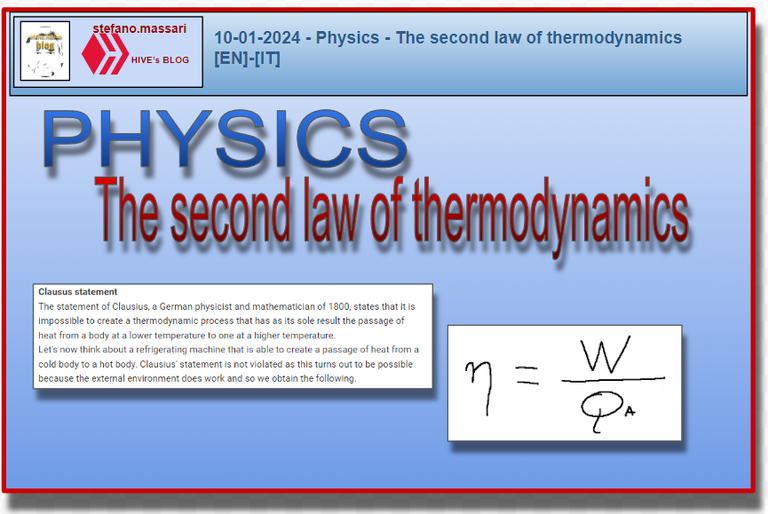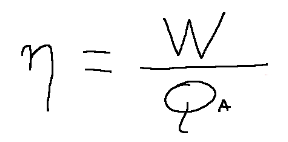10-01-2024 - Physics - The second law of thermodynamics [EN]-[IT]

~~~ La versione in italiano inizia subito dopo la versione in inglese ~~~
ENGLISH
10-01-2024 - Physics - The second law of thermodynamics [EN]-[IT]
The Second Law of Thermodynamics
The second law of thermodynamics establishes that for an isolated system it is not possible to create a heat machine capable of transforming all the heat into work.
The second law of thermodynamics is made up of several equivalent statements.
Clausus statement
The statement of Clausius, a German physicist and mathematician of 1800, states that it is impossible to create a thermodynamic process that has as its sole result the passage of heat from a body at a lower temperature to one at a higher temperature.
Let's now think about a refrigerating machine that is able to create a passage of heat from a cold body to a hot body. Clausius' statement is not violated as this turns out to be possible because the external environment does work and so we obtain the following.
- the forced passage of heat from the body at a lower temperature to one at a higher temperature
- subtraction of energy from the environment in the form of work.
Kelvin-Planck statement
it is impossible to carry out a thermodynamic transformation which has as its sole result the complete transformation into work of the heat absorbed from a source at constant temperature.
From this statement we can come to the conclusion that it is not possible to build a machine that has a 100% efficiency.
Since not all the absorbed heat (Qa) can be transformed, there will be a fraction of heat that the machine is not able to use and which is discarded, so that the work will always be less than the heat absorbed.
The efficiency is given by the ratio between the work and the heat absorbed, the formula is as follows:
So the main concept of this statement is that this ratio will always be less than 1, which translated into a percentage will always be less than 100%.

Conclusions
The second law of thermodynamics tells us that it is not possible to create a heat machine capable of transforming all the heat into work.
Request
How many times have you heard about experiments in which they tried to create a machine that had 100% efficiency?

10-01-2024 - Fisica - La seconda legge della termodinamica [EN]-[IT]
La seconda legge della termodinamica
La seconda legge della termodinamica stabilisce che per un sistema isolato non è possibile realizzare una macchina termica capace di trasformare tutto il calore in lavoro.
Il secondo principio della termodinamica è formato da diversi enunciati equivalenti.
Enunciato di Clausius
L’enunciato di Clausius, fisico e matematico tedesco del 1800, afferma che è impossibile realizzare un processo termodinamico che abbia come unico risultato il passaggio di calore da un corpo a temperatura minore ad uno a temperatura maggiore.
Pensiamo ora ad una macchina frigorifera che è in grado di creare un passaggio di calore da un corpo freddo ad un corpo caldo. L’enunciato di Clausius non è violato in quanto questo risulta essere possibile perché l’ambiente esterno compie un lavoro e così otteniamo quanto segue.
- il passaggio forzato di calore dal corpo a temperatura minore a quello a temperatura maggiore
- sottrazione di energia all’ambiente sotto forma di lavoro.
Enunciato di Kelvin-Planck
è impossibile realizzare una trasformazione termodinamica che abbia come unico risultato la completa trasformazione in lavoro del calore assorbito da una sorgente a temperatura costante.
Da questo enunciato possiamo arrivare alla conclusione che non è possibile costruire una macchina che abbia un rendimento del 100%.
Siccome non si può trasformare tutto il calore assorbito (Qa), ci sarà una frazione di calore che la macchina non è in grado di utilizzare e che viene scartato, cosicché il lavoro sarà sempre minore del calore assorbito.
Il rendimento è dato dal rapporto tra il lavoro ed il calore assorbito, in formula risulta come di seguito:
Quindi il concetto principale di questo enunciato è che questo rapporto sarà sempre minore di 1, che tradotto in percentuale sarà sempre minore del 100%.

Conclusioni
Il secondo principio della termodinamica ci dice che non è possibile realizzare una macchina termica capace di trasformare tutto il calore in lavoro.
Domanda
Quante volte avete sentito parlare di esperimenti in cui si tentava di creare una macchina che avesse un rendimento del 100%?
THE END
Thank you for giving information regarding thermodynamics' second law. Informative post.
thank you for reading! the second law of thermodynamics is clear, only in the ideal world can a machine be built that is capable of transforming all the heat absorbed into work... but who knows!! and what if it will be possible in 200 years?
I’m very sure that Thermodynamics must be a very wide course
Am I right?
I confirm, thermodynamics is a very broad topic that includes both ideal and real cases
I think I have actually hear about Kelvin Planck statement before though I can't remember
The Kelvin–Planck statement is also known as the second law of thermodynamics. This says that it is impossible to build a heat engine that transforms the heat absorbed from a single source and produces an equal amount of work.
In diverse occasioni, questo è generalmente ciò che si ricerca.
Mi fai pensare agli scienziati, queste persone tengono sempre conto di questi tentativi ed errori finché non raggiungono il 100% in quello che stanno cercando, penso che il vaccino contro il virus covid 19, hanno cercato e cercato e non hanno potuto dare il 100% percentuale, ora dicono che esiste una variante forte, la verità è che penso che questo sia più un losco affare dei governi per riattivare l'economia, vorrei sbagliarmi nella mia valutazione, molte persone hanno già il programma di vaccinazione .